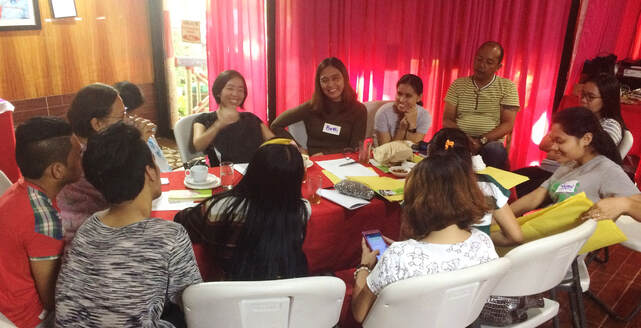|
‘We don’t have a plane crash scheduled for today, but I thought I’d take you through the emergency procedures just in case.’ (KLM Air Hostess) I love the difference that a sense of humour can make. The air hostess (above) made everyone laugh during the passenger safety briefing on a return flight from the Netherlands today. The airline’s own plane had experienced maintenance problems so it had had to borrow one from another airline. One hostess complained, with a glint in her eye, that the green décor didn't match the blue colour of her uniform. The passengers all laughed when another hostess made an announcement too, aiming to draw our attention to an apparent information light on the plane…only to correct herself moments later with, ‘Oh – this plane doesn’t have one!’ Brilliant. It took the terror out of the turbulence. On a more serious note, I had been in the Netherlands to work with a diverse NGO leadership team, to support its desire to enhance its international teamwork. I referenced briefly a couple of places in the Bible where the writer comments on the amazing potential of human diversity – where the Divine whole is seen, known and experienced to be more than the sum of its parts – yet also hints at the corresponding dark risks of undervaluing, fragmentation and conflict if not. Strikingly, the writer moves on in both places to emphasise a deep need for authentic love as the critical success factor. This insight set a spiritual-existential tone for the day, as we reflected on team-as-relationships. Returning to the plane – but this time as a metaphor, a participant from South Africa asked, ‘How many separate parts is a Boeing 747 aircraft made up of?’ Apparently, the answer is about 6,000,000. ‘And what do these diverse components all have in common?’ Puzzled faces all round now. ‘None of them can fly.’ I thought this was genius. What a great way to dispel the myth of the all-sufficient self in the face of the dynamic complexities of teams, organisations and wider world. We worked through an Appreciative Inquiry next, drawing on positives of the past and aspirations of the present to co-create shared trust and vision for the future. Set the trajectory. Fasten seatbelts. Enjoy the flight.
16 Comments
‘My life has been filled with terrible misfortunes; most of which never happened.’ (Michel de Montaigne) Imagination can be a rich blessing and a painful curse. On the one hand, it can enable the most amazing creativity and innovation; on the other, it can cause the most terrible suffering and pain. Learning to handle and harness the power of the imagination can be a very valuable skill. Yet it can feel like trying to tame a wild horse. We sense and feel its power and potential but can never quite control it. Sometimes it can inspire or entertain us; at other times, it can terrify or overwhelm us. I remember an advert for an organisation that supports people with a frightening, degenerative, physical disease. It said quite simply, yet so poignantly, ‘It’s what goes through your mind that’s the worst’. I remember, too, a colleague who comments that, ‘The past exists only in memory; the future exists only in imagination.’ Imagination creates the possibility to experience as-if reality, now. So, if that means experiencing our happiest dreams – good; if our worst nightmares – not good. An opportunity and a challenge is that the brain doesn’t distinguish sharply between actual reality and as-if reality. This means that, if we imagine something vividly enough, it can be as if, mentally, emotionally and physically, we go through that experience for real. That's great for fields like, say, Appreciative Inquiry that capitalise on positive imagination to create a better and brighter future; not great for professionals who experience, say, vicarious trauma or secondary traumatic stress. How do you draw on the immense power of imagination to achieve positive change? How do you avoid or address its potentially damaging effects? I was in Canada at a change leadership event aimed at paving the way for a new global initiative. My role was as organisation development consultant, invited to share psychological and cultural insights that could turn out to be significant as things moved forward. I was new to change management on such a large, complex, international scale and, at times, felt out of my depth, as did a number of my colleagues who were experienced experts in the field. We persevered and it was a useful event. At the end I asked Ric Matthews, programme leader, to give me some feedback on how he had experienced both me and my contribution during those 2 weeks. I was new to the organisation and keen to learn. He looked at me directly and gave me a fairly succinct list of things he had seen and had experienced as my strengths, along with a similar-length list of things that he had seen as my weaknesses. I could recognise everything he described and thanked him for his honesty and clarity. Ric ended by saying, ‘My advice is to focus on and build on your strengths, not to focus on and spend effort addressing your weaknesses. Your weaknesses may in fact turn out to be the flip sides of your strengths. In addressing your weaknesses, you may inadvertently undermine your strengths.’ This was my first introduction to an explicit strengths-based approach to leadership and change. It felt energising, inspiring and liberating. It has had a huge impact on my work and career since. If you’re familiar with appreciative inquiry and-or solutions-focused coaching, you will notice resonances with a strengths-based approach. It’s about building on what is going well, shifting our attention from problems to solutions, moving our gaze from deficits to possibilities. It’s being aware of what we do well, using and developing it and releasing our full potential to become all we can be. How do you use this type of positive psychology in your work as leader, coach, OD or trainer? My response was anything but appreciative. I had been invited to attend an Appreciative Inquiry (AI) workshop in the UK with a view to writing an article on it for a UK organisation development (OD) journal. At that time, AI was still a fairly new concept and approach and I was curious to learn what the hype was about and whether anything new and of substance lay behind the rhetoric. I left the workshop feeling distinctly unimpressed and with clichés like emperor’s new clothes floating in my mind. I subsequently wrote a scathingly cynical piece and the editor chose (wisely) not to publish it!
I’m pleased to say that was all a very long time ago now. Over the years since, I’ve returned to and experimented with AI on many occasions, increasingly convinced by its amazing potential and that of related fields such as Gestalt, social constructionism, strength-based/solutions-focused approaches and positive psychology. There’s something about what we notice and focus on and how we construe it that impacts profoundly on what we perceive as real, true and valuable, what sense we make of it, how we feel, what energy it releases – or not, how we respond what emerges or changes as a result. I drew on AI with faculty and staff at a ‘university for the poor’ in the Philippines recently. They were experiencing some challenges with cross-departmental working and wanted to find and agree ways to resolve them. I prayed, suggested an alternative hope-filled framing of ‘what is’ and proposed using AI for a 1-day whole group workshop with 4 sequential phases: 1. Stories: When have we been at our best? 2. Aspirations: What do we want to be more like, more of the time? 3. Ideas: What would need to happen for that to happen? 4. Commitments: What are we willing to do? The vision, energy, ideas and relationships that formed throughout this event were truly incredible – and proved transformational. So, I’m interested: what have been your best experiences of using AI? A well-known management development agency invited me to take part in a masterclass in Appreciative Inquiry (AI) some years ago, at around the time when AI was first becoming popular in the UK. The idea was that I would write a review of the workshop afterwards that would be published in the agency's monthly journal. I have to confess that I wasn't exactly blown away by the experience. Phrases like 'Emperor's New Clothes' came to mind and I wrote a critical review accordingly. Needless to say, it wasn't published!
I have, however, used aspects of AI on numerous occasions since with different people and organisations and I have to say I've been impressed by the results. I like its emphasis on imagination, positivity and solutions. It fits well with my beliefs from social constructionism about how we create and co-create our own realities. Its discover, dream, design and destiny phases can envision and energise, inspire and motivate people far more than any problem-solving approaches I've seen or used. A simple question such as, 'What has inspired you in the last month?' really can transform the focus and energy in a team. The best article I've read on the foundations of AI and what it involves in practice is by Richard Seele (2008): An Introduction to Appreciative Inquiry. If you're interested in the AI and to learn more about it, Richard's article is well worth a glance. I have used, adapted and applied aspects of AI without ever having worked systematically through its 4-stage process. I'd be interested to hear from you if you have: what was the issue/opportunity you focused on, how did you approach it, what questions did you pose at each stage, what happened as a result? I was speaking with a colleague recently who felt trapped in unresolved conflict. It was a key relationship, one that couldn’t be avoided, and all previous efforts had failed. As a consequence, both parties were feeling frustrated, de-energised and despondent about the future. As we explored how they had attempted to fix things in the past, it became clear they had focused on all the negatives…a long list of annoying and painful experiences from the past. Their conversations were characterised by blame and demands. It felt intractable.
The problem with such patterns of behaviour is that they create a negative expectation of the future. Both parties now felt stressed before they even spoke with each other. The stress affected their perspective and their resilience, their ability to hear and to cope. So we decided to try a different approach. How to build a positive expectation in order to create a different focus, a different conversation and, ultimately, a different relationship. It wouldn’t be easy but it felt worth a go. My colleague felt sceptical but, nevertheless, willing to give it a try. Firstly, we agreed that next time they spoke, they would meet off site in a physical environment (e.g. café, park) that they both found positively stimulating and energising. This helped to break them away from the current environment that held such negative memories for them. Secondly, we agreed they would speak only of the positive moments in their relationship together. They found this hard at first. The negative experiences felt so overwhelming that they could hardly think of any positives. Nevertheless, they managed to remember some examples. Thirdly, we agreed that after sharing such positive examples, they would each share future hopes for their relationship: ‘what we would like our relationship to be more like, more of the time’. They reflected each others’ hopes back to each other: ‘So you would like…’ Fourthly, we agreed they would move on to discuss ‘what it would take from me to make this work in practice’. This shifted each party’s focus from the other onto themselves. ‘This is how I would need to change…this is what it will take for me to do it…this is the help I will need.’ This kind of approach demands openness to fresh possibilities, humility, a willingness to forgive. It demands imagination and courage too, an ability to envision and embrace a new future. It’s not easy and the support of a friend, counsellor or coach can help make the journey possible. I would be interested to hear examples from others who’ve worked on conflict resolution too. What was the issue? How did you approach it? What happened as a result? What made the biggest difference? What did you learn? What would you do the same or differently next time? Have you ever found yourself facing a problem, an insurmountable challenge, that leaves you feeling frustrated, tired or stressed? Have you ever found it difficult to get an intractable problem out of your head, to step back and view the whole situation from a radically different perspective?
Carole Pemberton’s book, Coaching to Solutions (2006), presents a practical and hope-inspiring approach to coaching that aims to draws a client’s attention away from problems, diagnostics and analysis of the present or past towards future-orientated goals, resources and resourcefulness. It strikes me as a bit like appreciative inquiry. It’s an optimistic approach that focuses on the positive. ‘What would a great future look and feel like?’, ‘What are the strengths you can build on?’, ‘What resources are available in your environment to draw on?’, ‘Let’s plan the next steps.’ Anthony Grant (in The Coaching Psychologist journal, Dec 2011) explores this approach further in ways I found helpful so will share some of them here. He draws links between solutions focused coaching and insights and practices from other, more overtly psychological based schools. Firstly, solutions focused coaching has a ‘non-pathological orientation’. This is essentially means that when a person describes a problem he or she is facing, the coach sees this as an opportunity or challenge for the client to work on, rather than as some inherent deficit in the client. Secondly, it is ‘future orientated’. This is perhaps one of the greatest differences between solutions focused and traditional analytical approaches. The principal focus is on the client’s desired goals or future state, not on how or where he or she is now or on how he or she arrived here. Thirdly, it focuses on ‘constructing solutions and disengaging from problems’. It believes that when a client becomes preoccupied with a problem or the causes of the problem, he or she can get stuck. Instead, the coach challenges the client to focus on solutions that will move things forward. Fourthly, it is ‘outcome or goal orientated’. This means the coach will work with the client to help him or her envision a desired future and to plan the practical steps that will help him or her to achieve it. This could involve actively ignoring current problems and refocusing on solutions. Fifthly, it involves ‘utilising and activating existing client resources’. This means the solutions-focused coach will help raise the client’s awareness of personal resources (e.g. strengths, capabilities) and contextual resources (e.g. finances, networks) that he or she can draw on to move forward. Grant draws interesting parallels with other psychological schools. For instance, enabling the client to disengage from problems is similar to tackling rumination (persistent preoccupation with an issue) or problem-saturated thinking in cognitive behavioural therapy or coaching practice. Solution focused coaching’s emphasis on envisioning goals, where goals are ‘internal representations of desired states or outcomes’, is similar to principles in goal-setting psychology and client resource activation is similar to the strengths-based aspects of positive psychology (‘what am I good at?). So what might all of this look like in practice? Allow your mind to dwell for a moment on a problem you are facing currently. It may be large or small, recent or persistent. Now imagine putting it to one side and focus on what you want the future to look and feel like. Try to imagine and feel it vividly. Now allow your thoughts to ponder different ideas or approaches that could help you move towards that goal. Don’t be constrained by what you’ve tried previously or where you’ve become stuck. Allow yourself to think freely, to be playful as you imagine possible ways to achieve it. Jot down what resources you have that you could draw on to move forward. For example, previous experiences, prayer, expertise, money, friendships, contacts, personality traits. Again, allow yourself to be free and creative. Remind yourself of where and how you have been successful previously. Finally, capture your vision on paper. Perhaps draw it as a picture, a symbol, a journey. Something evocative and compelling for you. Add the resources you can draw on to move forward. Write down your next steps and, in doing so, make them practical – and choose to do them. This can feel easier said than done when doing it alone, hence the value of working with or as a skilled coach or therapist. If you find it difficult, try doing it with someone else who’s prepared to guide, pose the questions and to gently challenge any unhelpful or unfounded assumptions. Solution focused coaching can feel encouraging, empowering and releasing. It helps to break negative patterns of thought that drain our energy and limit our effectiveness. It isn’t a magic bullet for all situations but it can make a refreshing change to traditional analysis and problem-solving. I glanced at a book today on coaching using appreciative inquiry (AI). AI is an optimistic, solutions-focused approach that aims to (a) generate vision (b) and galvinise the client's energy and commitment by framing questions, reflections and challenges in the positive. Here are some sample questions:
What would a great outcome look and feel like? What would make this a great experience for you? Which aspects of this do you enjoy most? What would make this a genuinely rewarding experience for you? How come this is so energising for you? Where does your passion come from? Tell me about a recent experience where you found yourselves in agreement about something? Give me an example of an interaction with this person when you didn’t get frustrated? How far do we need to go to get back to a time when this wasn’t a problem? Which aspects of this did go well? When did you first begin to notice that things were changing for the better? If you believed you could do this, what would you do next? What would a great solution be? What would mark a positive step foward? If we weren’t talking about this, what would we be talking about? If you were leader of this organisation, what is the first thing you would do to resolve this? What story would you like to tell someone about this? How do you make sense of this? What else could I usefully ask you at this point? And an AI question to finish: what did you find most helpful about this blog? I smiled today when a colleague invited me to explain appreciative inquiry (AI), ‘because it sounds like an optimistic approach to problem solving’.
The wonderful paradox lay in the framing of the question itself. AI is an outlook manifested in an approach that challenges conventional problem-solving. It frames issues and experiences not in terms of problems to be solved but opportunities to be grasped. It draws the attention away from problems and deficits towards positive attributes and potential. Unlike rational analytical problem-solving, AI evokes and draws on the power of positive and vivid imagination. It aims to create a compelling vision that stimulates motivation and drives people energetically forward. It reframes situations by encouraging people to think in fresh ways, to notice the unnoticed, to experience and celebrate the joy of success. Imagine looking back on a project. Use your imagination to put yourself back into a phase when things went really well. What happened? What did people say or do that made the difference? How did it feel at the time? What do you want to repeat or build on when you approach a new project? What positive platform has the outcome of that project created for the future? Even those most challenging aspects can be open to reframing. When we felt frustrated, what underlying positive desire did the frustration point towards? What did it reveal about our hopes, dreams, values, aspirations, even if they felt thwarted? In light of that experience, what has it revealed that we want to be more like, more of the time? Thinking forward to the future. Use your imagination to picture a really exciting and positive outcome. What would be happening? What kind of looks would people have on their faces? What would they be saying? How would you and they be feeling? ‘Imagine...’ The idea is to generate a vision that’s so compelling that people will have the energy to overcome any obstacles on route. The trick is in not to use AI to avoid, deny or gloss over problems, setbacks and difficulties. It doesn’t intend to build a naive idealism. Where people have experienced or anticipate trauma, frustrations etc and where real problems and blockages have emerged, acknowledge these things honestly and sensitively before moving to explore potential up-sides and a way forward. |
Nick WrightI'm a psychological coach, trainer and OD consultant. Curious to discover how can I help you? Get in touch! Like what you read? Simply enter your email address below to receive regular blog updates!
|







 RSS Feed
RSS Feed